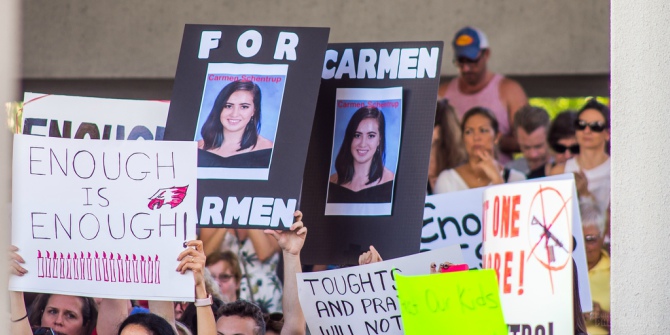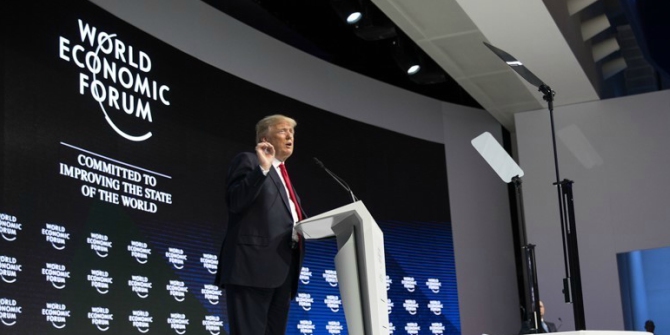

 In the wake of the mass shooting at Marjory Stoneman Douglas High School in Parkland, Florida, gun control has remained on the political and media agendas for far longer than has been the case following similar events in the past. Joseph E. Uscinski, Darin DeWitt, and Matthew D. Atkinson argue that this shooting has continued to capture the nation’s attention because of the conspiracy theory narratives that surround it. The politically strategic Parkland students have benefited from the public attention generated by conspiracy theorists – who accuse the students of being ‘crisis actors’ – to remain in the media spotlight and keep the issue of gun control on the national agenda.
In the wake of the mass shooting at Marjory Stoneman Douglas High School in Parkland, Florida, gun control has remained on the political and media agendas for far longer than has been the case following similar events in the past. Joseph E. Uscinski, Darin DeWitt, and Matthew D. Atkinson argue that this shooting has continued to capture the nation’s attention because of the conspiracy theory narratives that surround it. The politically strategic Parkland students have benefited from the public attention generated by conspiracy theorists – who accuse the students of being ‘crisis actors’ – to remain in the media spotlight and keep the issue of gun control on the national agenda.
Following the school shooting at Parkland, Florida, the student and parent activists have been quite successful at keeping gun control on the national agenda. Whereas previous shootings did not spur sustained conversation, this most recent tragedy has led to gun reform in Republican controlled Florida and it may make gun control a major issue in the upcoming midterm elections. It may also lead to meaningful gun legislation enacted by a Republican Congress. Why has this particular shooting been able capture the nation’s attention and focus it on gun control for so long?
We argue that conspiracy theories were critical to the sustained attention received by the Parkland shooting. This is because the media prioritizes narratives driven by conflict. Typically, a mass shooting provides enough conflict to drive a few days of coverage. Once the media spotlight shifts, the activists lose the platform they need to keep the issue alive. In the Parkland case, the student activists benefited from conspiracy theory entrepreneurs. When conspiracy theorists claimed that the Parkland students are either paid actors or George Soros-funded puppets, they produced enough conflict to sustain the spotlight.
Here are the reasons why conspiracy theory politics contributed to the success of the Parkland students.
-
Data doesn’t move people
Arguments based on data and facts – such as public health statistics on guns – don’t capture the public’s attention. Typically, data-driven information fails to convince, and in certain circumstances may even backfire, as Brendan Nyhan and Jason Reifler have demonstrated. As neuroscientist Tali Sharot argues, “Numbers and statistics are necessary and wonderful for uncovering the truth, but they’re not enough to change beliefs, and they are practically useless for motivating action.” Sharot’s insight accounts for why efforts to advance gun control legislation have stalled after previous mass shootings.
Emotions and group identities drive much of our decision-making. Data-driven rational arguments fail to appeal to what really motivates us. Sharot explains, “the problem with an approach that prioritizes information and logic is that it ignores the core of what makes you and me human: our motives, our fears, our hopes and desires.”
-
Narratives with heroes and villains are more persuasive than data
Successful political movements require collective action. Policy entrepreneurs need to engage the efforts of large numbers of people. Needless to say, as we show in our forthcoming research, this is not easy to do and even high-profile celebrities like George Clooney rarely succeed in mobilizing political action. In practice, sustained attention is captured through the presentation of a narrative that includes a compelling hero, a powerful villain, and an identifiable victim. This conflictual narrative captures media and public attention, which, in turn, motivates people to prioritize the associated issue. With Parkland, the survivors serve as heroes, their classmates victims, and gun rights advocates as villains.

“BSTK7193” by Barry Stock is licensed under CC BY SA 2.0
As political scientist Erica Marat argues “the presence of an identifiable victim who becomes a visible symbol of resistance” galvanizes “public sympathy with the victims of violence.” This explains why the Parkland shooting captured more attention than the Las Vegas music festival shooting, where more than three times the number of people died. The Parkland incident was better suited to public sympathy because the vast majority of the public could readily identify with high school victims and imagine how such tragedies could one day afflict their own communities.
-
“Lies spread faster than truth” and conspiracy theorists use this fact to great effect
Nothing beats a conspiracy theory when it comes to crafting a conflictual narrative with a compelling hero and powerful villain. Conspiracy theories always have good villains — bad people who are plotting in secret to destroy people like “us.” As narratives that incite anxiety and fear, conspiracy theories spread much more effectively than factual arguments.
Conspiracy narratives about Parkland suggest the teenage activists are faking the tragedy, being used by George Soros to push a political agenda, or are being used by mainstream liberal media to push an anti-gun agenda. These conspiracy narratives provide a villain – the government, George Soros, or the mainstream media. In fact, the people who developed some of these conspiracy theories purposely chose narratives with enemies because they knew these would spread easily.
-
Conspiracy theorists make great villains too
Conspiracy theories are more successful when the villains they accuse have real power. When conspiracy theorists make unfair and unfounded allegations about the powerful, the public tends to be relatively indifferent. However, when conspiracy theorists attack relatively powerless and sympathetic targets, they engender backlash. In the Parkland case, the backlash created a compelling media narrative that kept the issue alive. In fact, the student activists have thanked the conspiracy theorists for creating the conflict necessary to sustain media attention. And, an analysis of social media finds:
People outraged by the conspiracy helped to promote it—in some cases far more than the supporters of the story. … This unintended amplification created by outrage-sharing may have helped put the conspiracy in front of more unsuspecting people.
The strategic political tactics of the Parkland students
Mainstream political leaders who want to avoid conspiracy theory politics have a tough task – they don’t have the easy narratives available for mobilizing action and concern. Such leaders need to be strategic in terms of choosing political tactics that work and come to terms with the fact that sound arguments with reason, logic, and evidence are often ineffective. The Parkland students have given us a useful case study in strategic political tactics. Namely, the attention readily courted by conspiracy theorists can be leveraged by activists on the other side of the issue. The Parkland students advanced their own political goals by strategically taking advantage of a compelling conflict created by conspiracy theorists. The students show how the attention generated by conspiracy theories can be used against the conspiracy theorists themselves.
- This article is based on the paper, ‘Does Celebrity Issue Advocacy Mobilize Issue Publics?’ In Political Studies.
Please read our comments policy before commenting.
Note: This article gives the views of the author, and not the position of USAPP – American Politics and Policy, nor the London School of Economics.
Shortened URL for this post: http://bit.ly/2p8zdUQ
About the authors
 Joseph E. Uscinski – University of Miami
Joseph E. Uscinski – University of Miami
Joseph E. Uscinski is an associate professor of political science at University of Miami and co-author of American Conspiracy Theories.
_
 Darin DeWitt - California State University Long Beach
Darin DeWitt - California State University Long Beach
Darin DeWitt is an assistant professor of political science at California State University Long Beach.
_
 Matthew D. Atkinson – Long Beach City College
Matthew D. Atkinson – Long Beach City College
Matthew D. Atkinson is an assistant professor of political science at Long Beach City College.




